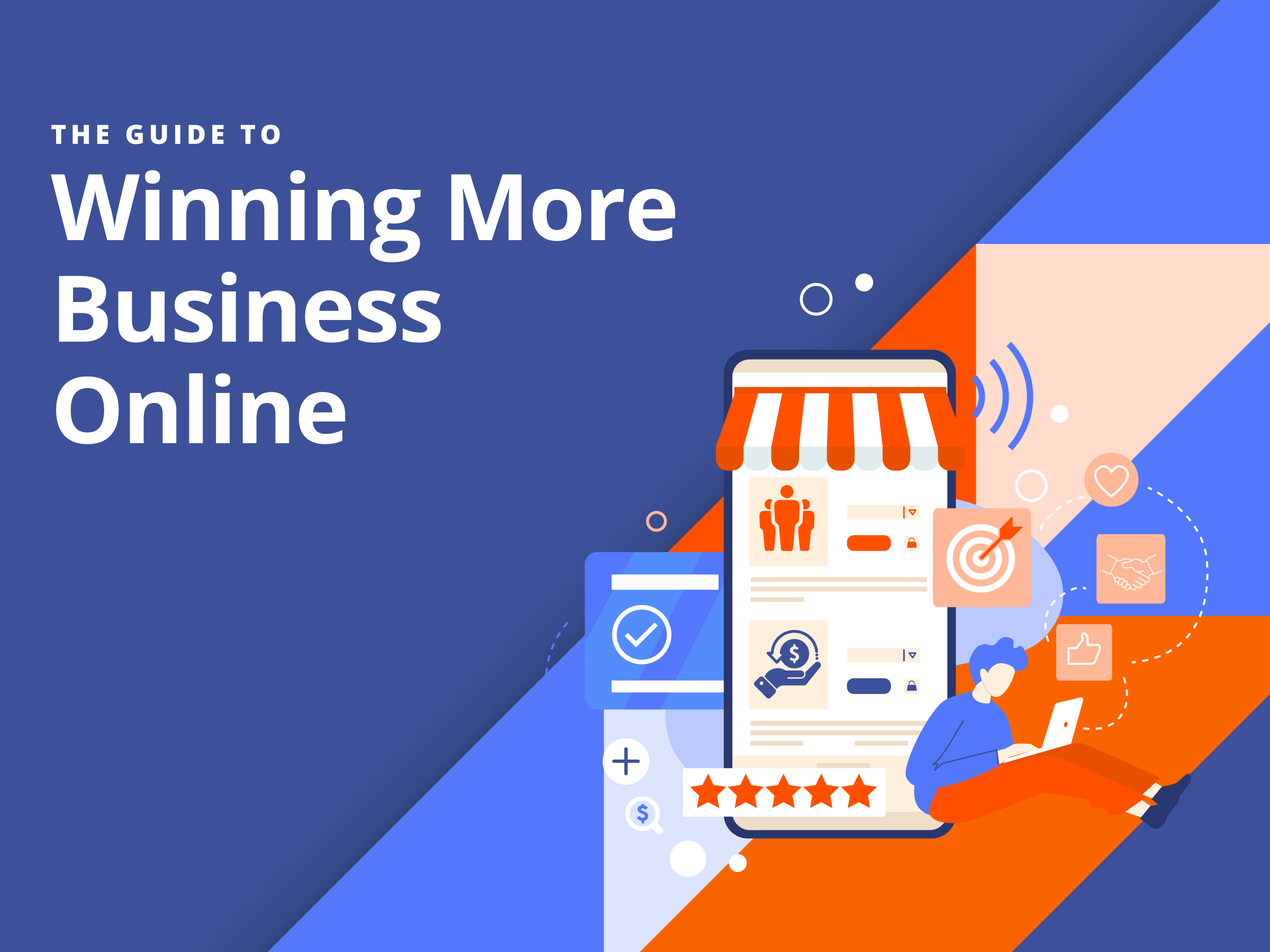With so many businesses investing in social media marketing, it can feel like having a business website is unnecessary. In fact, 28% of small businesses don’t.
At first glance, that may seem small, but to put it into perspective, of the 31.7 million documented small businesses, that’s more than 8 million website-less businesses.
A business website provides a go-to place for your marketing efforts. It helps you promote your business, sell your services and stand out from the competition.
But it takes more than just throwing your information online to build a business website that becomes the go-to place for your current and potential customers.
Consider these five elements your website needs to stand out.

The Guide to Winning More Business Online
Download1. Design That Delivers a Top-Notch Experience
Your customers’ first impression of your business occurs long before you even realize it. Meeting a new client face-to-face is usually your second or third chance to make an impression. Why? Because they’ve met your business website already.
38.5% of website visitorsform their opinion of a business based on their first experience with a website
Consider these five essentials to ensure your business website measures up to the exceptional service your business provides.
- Design. Customers will leave your website if it doesn’t have an attractive layout. I’m not talking about having an endless scroll background and the craziest fonts you can find. At a minimum, create a website that looks professional and provides visitors the information they want easily. Click here for some tips on creating a great website aestheticwithout calling in a website designer.
- Mobile-friendliness. More than half of online consumers in the US search for local businesses via their mobile browser. When someone finds your business online, they’re going to want to look around and learn more about your business. A bad mobile website experience can inflict more damage than just turning them off. Make sure your business website is optimized for mobile viewingwith an easy-to-use menu and appropriate font sizes.
- Speed. We live in a world that runs on instant gratification. Your business website is no exception. Did you know that 40% of people will leave a website if it takes more than three seconds to load? Talk about a lot of lost business. Use smaller images and image file sizes, add images sparingly and push important information above the scroll point to cut down on slow loading speeds.
- Information. When someone comes to your website, they’re looking for information. Make sure you’re detailing your services, business background, any frequently asked questions as well as contact information and hours of operation.
- Calls to action. Once those browsing on your site get the information they came for, they’ll need a nudge in the sales direction. This is where having a CTA comes into play. Your website should clearly show customers where to click to book an appointment.
2. Content That Attracts Customers
Maybe you’ve had a business website before but the traffic was so low it seemed like a wasted effort. So you may be wondering, “How do the majority of potential customers find business websites?”
The answer? Content. By adding new and useful content often, you can increase your search engine rankings.
Some content worth creating and adding to your website are:
- Blog posts
- Articles
- White papers
- eBooks
- Reports
- Podcasts
- Videos
- Infographics
Keep in mind that content alone may not be enough to bring in all the traffic you’re hoping for, so take the extra step and look into search engine optimization trends you can implement.
A few keywords added to your content can go a long way when it comes to getting new eyes on your content and website.
Start using web analytic tools to get a big picture view. How can businesses benefit from using analytics on their website? Google Search Console can show you which keywords and search queries deliver the most eyes to your website.
On the other hand, Google Analytics shows an abundance of information ranging from where traffic comes from to where your website visitors spend the bulk of their time on your site.
90% of consumers use online search to find local businesses.
3. Information That Builds Trust
Every business transaction is an act of trust but, before customers swipe their card, they need to have faith in you as a provider. Give them something to believe in by making sure your website shares a bit about what your business stands for and what it’s all about.
Adding these three items to your business website is significant support when looking to build trust.
- Reviews. Including reviews on your website allows potential customers to see what others really think of your business. Just use a widget to add Google and Yelp reviews directly to your website. Be sure to keep an eye on any negative reviews that may come in and quickly address them. This shows potential customers you care about the quality of service your business provides, and are dedicated to rectifying issues. Add a review link to your invoices and automated marketing efforts to make it easy for customers to post their reviews quickly. The Google Review Link Generator will give you a custom link in seconds so you can send customers exactly to where they can leave reviews.
- About Us page. Did you know this is typically one of the most-viewed pages on a business website? That’s because those who stumble across your business want to know more about it. How did the company come to be and what makes you stand out against competitors? Again, when visitors are searching through your website, they’re looking for answers. By including humanizing touches like photos of your staff, you can establish an emotional connection.
- Awards. While it’s important to stay humble, your business deserves to brag a bit. If it’s been recognized for some outstanding achievement, it should be noted on your site. After all, what screams “reputable” more than having your business awarded?
4. Information That’s Helpful
As we’ve been saying, your customers want answers. Don’t make them fight to find them. If your customers can’t find what they’re looking for, you and they will have missed an opportunity.
Here are five ways you can provide helpful information to your website visitors.
- Writing in a language that’s easy to understand. Your visitors aren’t professionals. That’s why they hired YOU. So avoid using lofty jargon when explaining your services and benefits.
- Give them details that make you stand out. Do you offer evening appointments? Are your services environmentally friendly? These details will help you stand out against competitors and land your ideal client.
- Include a frequently asked questions page. This is a great catch-all for typical questions your business might receive.
5. Action Items That Get Visitors Engaged
If your business website doesn’t include ways to move a visitor towards a sale, you’re missing out on opportunities. You wouldn’t be alone though. Only 47% of websites have a clear call-to-action (CTA) button that takes users three seconds or less to see.
CTAs tell website visitors what to do next. And when they do, that click-through “conversion” helps your click-through rate, which further boosts your search engine ranking.
CTAs aren’t the only way to engage website visitors. Special discount offers can be all the incentive some people need to try your business out.
Those not ready to dive into doing business with your company still have the chance to engage with your website through content they find useful.
Blogs like “Top 10 Ways to Keep Your Lawn Healthy” are helpful but not a commitment. And if you make the content “gated” — meaning you ask for information from the viewer before you release the content to them — you gain a lead.
Overall, it’s important to remember your potential client’s first impressions of your business occur well before you know they exist.
Make sure your company website sells your business as the five-star option you know it is. People are looking for businesses they can trust. Make sure they can find you.

The Guide to Winning
More Business Online
Want customers to find you online? A website is not enough.







